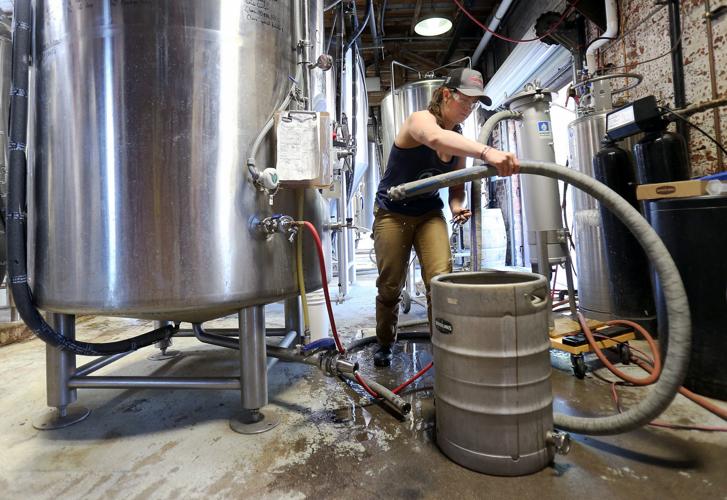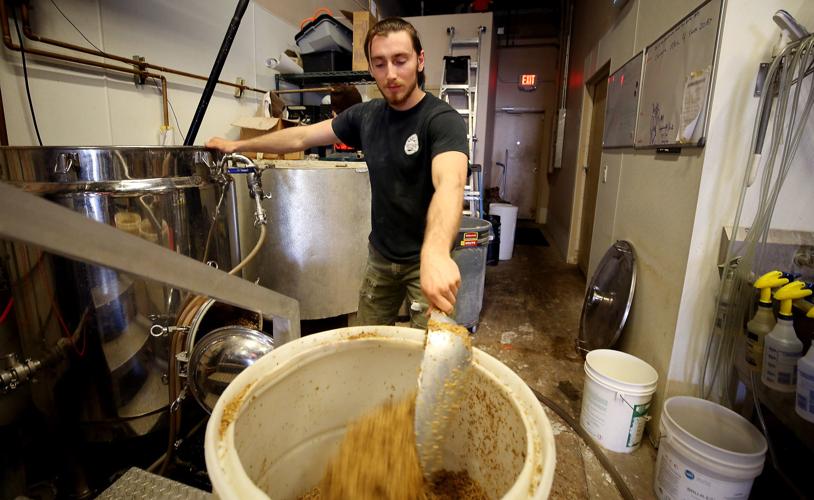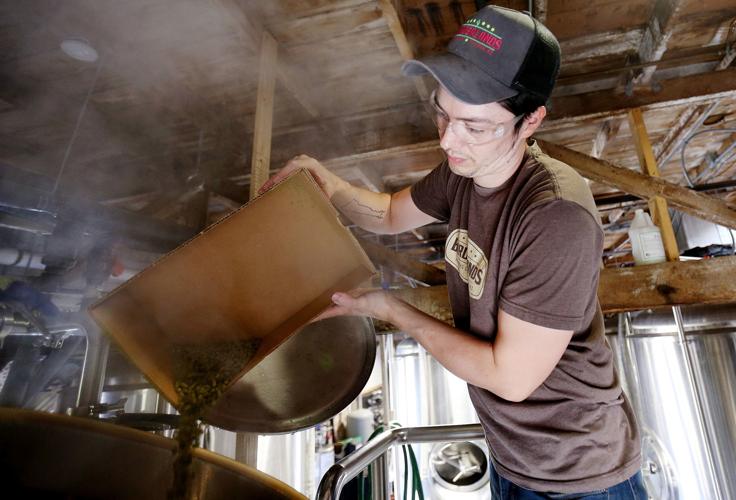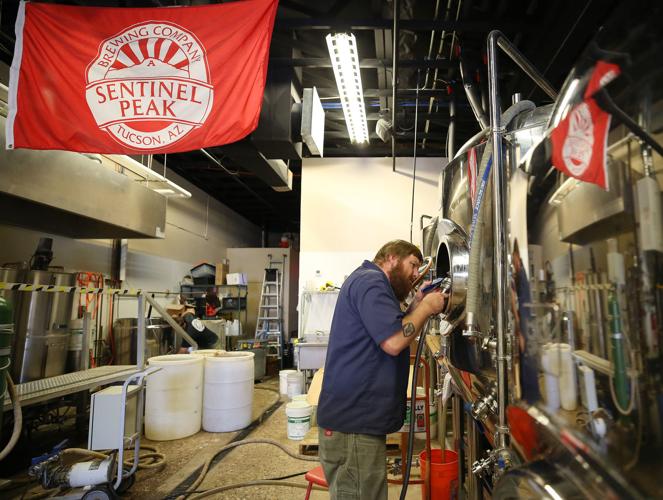There’s another new brewery in town, but you won’t find its brand on bar taps or cans.
Locally owned Sentinel Peak Brewing and Borderlands Brewing have created a new entity, Voltron Brewing Co., to oversee a joint brewing operation under development near downtown that will allow both brewers to significantly expand production.
It’s just the latest example of growth in Tucson’s craft-beer industry, which welcomed four new breweries and saw others expand in 2017.
Voltron, which is jointly owned by both breweries, won’t brew beer itself but was formed to hold and manage a lease, a state liquor license and other permits at a new production space on South Toole Avenue where each company will brew and package its own brews in the next few months, said Jeremy Hilderbrand, co-owner of Sentinel Peak.
Sentinel Peak said in December that it signed a lease for 8,750 square feet of space in an industrial building at 330 S. Toole Ave., which also houses a climbing gym, to expand production.
“We just cannot keep up with demand for the beer, so we need to get this production facility up as soon as possible,” Hilderbrand said, noting that initial utilities work has begun on the new site.
But Sentinel Peak had been looking for a partner to share the space and started talking to the folks at Borderlands, which was in the same capacity crunch.
Both Sentinel Peak and Borderlands package several styles of beer in cans for retail sales, driving production volume.
“We’ve outgrown our current building — it can’t support any more weight on the floor,” Borderlands president Mike Mallozzi said of the current brewery and taproom at 119 E. Toole Ave. “We have to maintain our distribution throughout the state, so I couldn’t have managed a project like this without the help of those guys.”
“They were ready for a new space, we were ready for a new space and instead of both of us starting from scratch we decided to join forces,” Hilderbrand said, estimating the cost of the building improvements to be at least $100,000.
Borderlands and Sentinel Peak will shift production to the new building in the next couple of months but they won’t be leaving their current locations. There’s room for a taproom at the new site but no near-term plan to open one.
Sentinel Peak will move a 15-barrel brewing system it recently purchased from Dragoon Brewing — another rapidly growing Tucson microbrewery — to the new space and begin production there before halting production at its current location at 4746 E. Grant Road, where it will use the vacated brewing space to host private parties.
“As soon as we move in, it will quadruple our production capacity, and that’s not even pushing that system to the max,” Hildebrand said.
RAMPING UP
Sentinel Peak more than doubled its annual production in 2017 to 33,436 gallons, according to production data filed with the state Department of Liquor Licenses and Control.
Borderlands, meanwhile, has been ramping up extra production to keep its beer flowing during the week or so it will take to move its 20-barrel brewing system to the new space, Mallozzi said.
“We’ve been working for a little while now to build up inventory for our distributors, so there will be a little cushion when we move,” he said.
Borderlands boosted production 73 percent last year to 34,915 gallons, nearing the theoretical limit of its current brewhouse, Mallozzi said.
Overall, the 104 Arizona microbreweries that report production to the state produced 3.6 million gallons of beer last year. That’s up 23 percent from 2016, when 97 brewers were classified as microbreweries.
There were 21 state-regulated microbreweries in Pima County in 2017, up from just seven in 2012. Most are smaller brewers who mainly sell draft beer kegs for taprooms and bars, though some bottle or can small production runs using temporary equipment.
Some larger Arizona breweries have dropped off the state’s microbrewery list in recent years because they were acquired by national brands, such as Tempe-based Four Peaks Brewing, which was acquired by AB InBev in late 2015.
CONTINUOUS GROWTH
Tucson’s biggest breweries, Barrio Brewing Co. and Dragoon Brewing Co., also have expanded production and distribution in the past couple of years.
Barrio Brewing founder and owner Dennis Arnold said the company’s production rose 18 percent from 2016 to 2017, when the brewery made 392,553 gallons of beer, and production is up 23 percent for the first quarter of this year.
Arnold, who is seen as a pioneer in the modern Arizona brewing industry after founding Gentle Ben’s Brewing in 1991 and Barrio in 2007, tripled the capacity of his brewhouse in 2013 as it starting canning its beers.
“If you want to get bigger, you’ve got to get it into a package,” Arnold said, noting that only about 10 percent of beer is sold in kegs.
But it takes a lot of persistence and hard work to make canned or bottled beer a success, as breweries compete for precious shelf space amid competition from big beer companies like AB InBev and Constellation that have bought up regional craft breweries and can muscle their beers onto store shelves.
“The competition is beyond fierce to get that package on the shelf,” Arnold said.
Arnold said a big break for Barrio came a couple of years ago when Phoenix-based Hensley Beverage Co. bought Tucson-based Golden Eagle Distributors, Barrio’s distributor at the time.
“That gave us access to the Phoenix market, where we hadn’t been before,” Arnold said.
Dragoon, the second-largest Tucson microbrewery by production volume reported to the state, boosted production 28 percent in 2017 to 221,186 gallons of beer after expanding its brewhouse in mid-2017.
Tristan White, co-founder and manager of Dragoon Brewing, said after expanding its canning line and brewing equipment, the company will soon have to increase the capacity of its fermentation tanks — which receive and ferment the beer after initial brewing — to keep up with demand.
“When you upgrade one, as you continue to grow then another one is now your bottleneck,” White said.
BILLION-DOLLAR
STATE INDUSTRY
Dragoon cans several styles of its beers, including its flagship IPA, that are now distributed nearly statewide through several distributors, including Tucson-based Finley Distributing, White said.
White believes the state’s craft-beer industry still has a lot of room to grow, citing industry statistics showing that Arizona’s preference for mass-brewed American light lagers like Bud Light and Miller Lite remain high among the states.
“There’s a lot of room in Arizona,” White said. “I don’t think we’re overbrewed at all.”
In 2016, Arizona ranked 33nd among the states with 1.8 craft breweries per 100,000 adults, compared with Western peers Colorado at 8.4 and Oregon at 8.1, according to the Brewers Association.
Nationally, U.S. craft-brew sales rose 5 percent in 2017 to $26 billion, even as overall beer sales fell 1.2 percent, while craft brew’s market share rose to 12.7 percent, the independent brewers trade group said.
In Arizona, craft breweries had a $998 million economic impact in 2016, with 7,838 full-time equivalent employees earning $361 million in income alone, the Brewers Association said.
Much of that money used to go to mass out-of-state brewers like AB InBev and MillerCoors.
“Having the brewing done locally does contribute to value added locally,” said George Hammond, director of the Economic and Business Research Center at the University of Arizona’s Eller College of Management. “That means increased jobs, income, and overall economic activity.”
“It probably also contributes to increased consumer satisfaction, with increased variety that is likely targeted to pleasing, at least to some extent, local tastes,” Hammond added.







